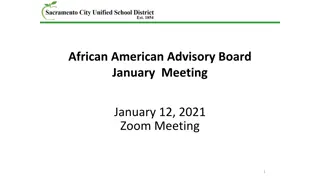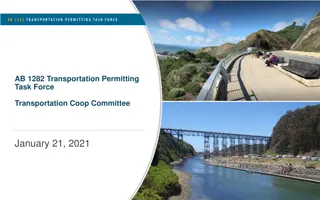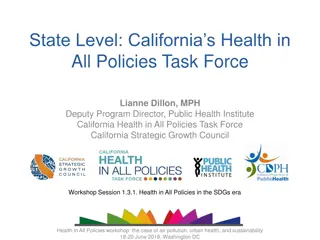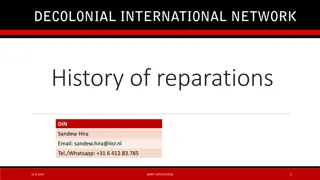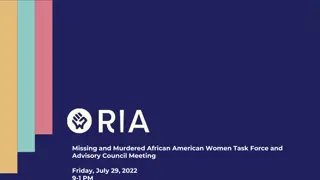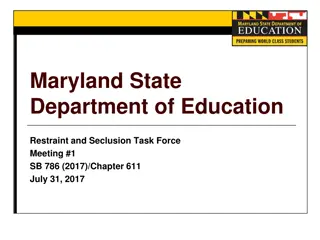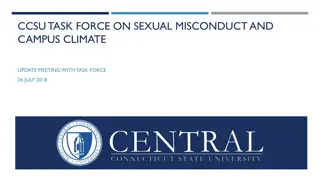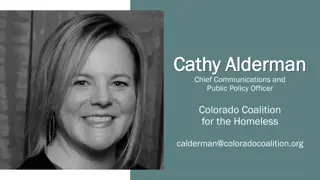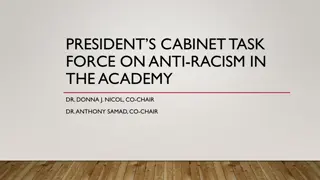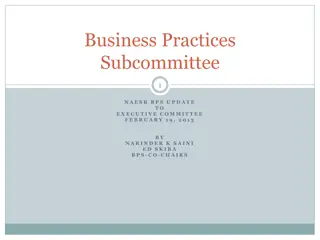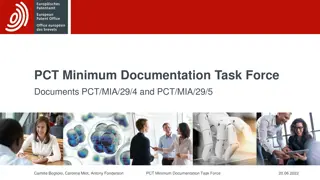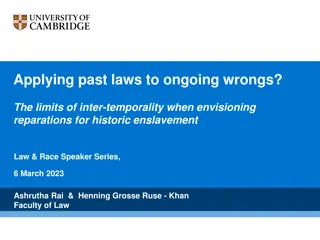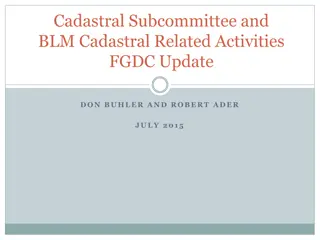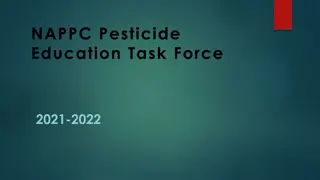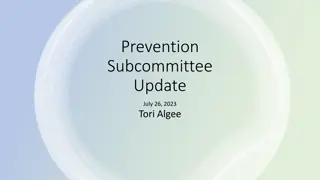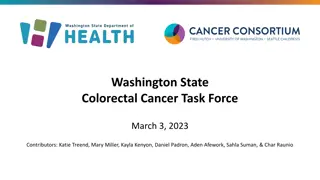African American Reparations Task Force Advisory Policy Subcommittee Update
The African American Reparations Task Force Advisory Policy Subcommittee in San Francisco aims to develop policy and legislative priorities focusing on reparations for African Americans. Their objectives include reviewing laws impacting Black people, collaborating with other subcommittees, and proposing reparation legislation to benefit Black individuals in San Francisco. The history of San Francisco and the establishment of laws in the city are also discussed.
Download Presentation

Please find below an Image/Link to download the presentation.
The content on the website is provided AS IS for your information and personal use only. It may not be sold, licensed, or shared on other websites without obtaining consent from the author. Download presentation by click this link. If you encounter any issues during the download, it is possible that the publisher has removed the file from their server.
E N D
Presentation Transcript
AFRICAN AMERICAN REPARATIONS TASK FORCE ADVISORY Policy Subcommittee Update Report for September 12, 2022 Subcommittee Members: Daniel Landry (Subcommittee Lead), Nicole Cunningham, Omerede Rico Hamilton, Yolanda Harris, James Lance Taylor, and Gwen Brown..
PURPOSE: Our intention is to develop policy and legislative priorities centering reparations for African Americans that can be implemented as part of the San Francisco City Charter.
OBJECTIVES 1. We will choose current enforceable laws that disproportionately affect Black people. 1. We will unpack and review the current laws that have negatively impact Black people. 1. We will partner and work closely with the education Subcommittee and the Economic Empowerment Subcommittee to collaborate to ensure policies are concise and synchronized. 1. We will begin to research how to make legislation with teenth from previous recommendations put before the city i.e., African American Out Migration Report, Unfinished Agenda, and the War on Drugs Report. 1. We will review other African American Task Force Committee Subcommittee initial proposed recommendations policies prior to final submission to the BOS and the Mayor. 1. Who is impacted? Entire Black population in San Francisco Specific Populations: Infants, children, adults, and seniors. In all San Francisco Neighborhoods, Zip codes, and impacted citywide.
OUTCOMES All reparation legislation policies proposed to the City of San Francisco will become law. Each Black/African American individual, born and raised and who has lived in San Francisco since the incorporation of the City and County of San Francisco will receives reparations.
HISTORY of SAN FRANCISCO Originally known as Yerba Buena and land of the Ohlone People. San Francisco was founded in 1779 and named after Saint Francis Drake. On April 15, 1850 the City and County of San Francisco was incorporated.
How policy laws are established in San Francisco? Governmental policies or laws can be established either by the Board of Supervisors, the Mayor, or by the people through a ballot initiative approved by the majority vote of San Francisciscan. Any laws can be challenged here locally, on a state level, and/or in federal court.
13th amendment Black codes/slave codes Debt servitude & debt bondage. Pig Laws. Sharecropping. Article 34. Jim Crow. Eminent Domain. Redling. Welfare aka AFDC. War on Drugs. Racial profiling. PAST HARMS
Prop. 209. Housing evictions. Student loans & child support laws. Zoning laws restrictions. 3 Strikes & mandatory sentencing. Non-oversight for community benefits. Youth and young adults resources. Educational policies. Failed redevelopment projects. Health disparities. Environmental Injustice. Income wages gap. Bank loans & credit discrimnation. Black owned businesses decline Black Population in SF decline. Continuing HARM:
IMPLEMENTATION OF REPARATIONS LEGISLATION: 1. Identify specific policies to change or amend to mandate reparations through city ordinances and through again the city charter. 1. Research previous and current city tax codes to help craft a Reparations Tax. 1. Implement past recommendations of reports, and studies by rewriting the language to meet city policy standards.
AREAS OF FOCUS: 1. Systemic Disparities: In the legal system, the health institutions, In the area of housing, education, and the criminal system. 1. In the Institutional areas: That have legally hindered Black people in San Francisco from establish generational wealth.
Past Recommendations for consideration: Unfinished Agenda of 1993: There was 23 Recommendations Actions in the report. Recommendation 1 and 2 talked about creating policy to increase African Americans income, and Recomm - endation 3 talked about establishing a voluntary fund Tax to develop an African American foundation. Out Migration Report of 2009: The Out Migration Report overall recommendations covered housing, education/ economic development, cultural & social life, along with Public Safety & QOL issues.
War on Drugs Report of 2015: The community urged 12 recommendations to the SF Human Rights commission. Here s some that can immediately be implemented: 1. Lifs the lifetime ban on Calfresh assistance for people with low-levels drug convictions. 2. Expands post-conviction dismissal and provides that individuals who receive local sentences under the new realignment laws have an opportunity to petition for set aside and dismissal under Penal Code 1203.4 (also known as expungement ). African American Historic Context Statement of 2016: Explore the Federal Rehabilitation Tax Incentive. Explore the Transient Occupancy Tax.
Reparations Tax: We have identified two options: 1. Increasing the User Sales Tax to 9.5 %. San Francisco. 2. Establish a Special Tax on the bank institutions and insurance companies who admitted to playing a role in slavery.
Additional Policy subcommittee proposed areas for Reparations: Fillmore Heritage Center should be given as an asset to the Black community, and A cooperative entity must be structure for shareholder ownership. City of San Francisco should payoff all Mortgages for housing cooperatives. Creation of BlackCARD which Anieties Economic Subcommittee is working on. City of San Francisco needs to look into land acquisition illegally acquired by eminent domain and redistributed to the Black community. Creating something like a Reparations Commission that will have more teeth. A form of land own by the City and County of San Francisco.
Getting around Prop 209: Obstacle: Proposition 209 is a California ballot proposition which, upon amended the State Constitution to prohibit state governmental institutions from considering Race, Sex, or ethnicity, specifically in the areas of public employment, pubic contractings, and education. A Possible Solution: Create an ELIGIBILITY CLASS CRITERIA. Design a eligibility group based on lineage and ancestry of those who are descenants from US Slavery and Jim Crow.
Research, Outreach, and Consulting Advice: - N'COBRA - Evaniston. IL Reparations policy reviewed. - Community At-large: Elder Sammie Broadnax, & Ken Johnson - De'Anthony Jones, CCSF - Ira Mosely, IRS Tax Expert - Chris Lodgson, & CJEC team AFRICAN AMERICAN REPARATIONS TASKFORCE ADVISORY COMMITTEE
MILESTONES June 1, Dec. 1 Dec. 1 June 1, Jan. 18, 2021 2021 2022 2023 2024 Submit Draft Report Submit Final Plan Sunset of AARAC First Meeting First Report
For more Info. Daniel Landry, Policy Subcommittee Lead E-mail: danielb.landry@yahoo.com San Francisco Human Rights Commission www.sfreparations.org / reparations@sfgov.org Thank You!
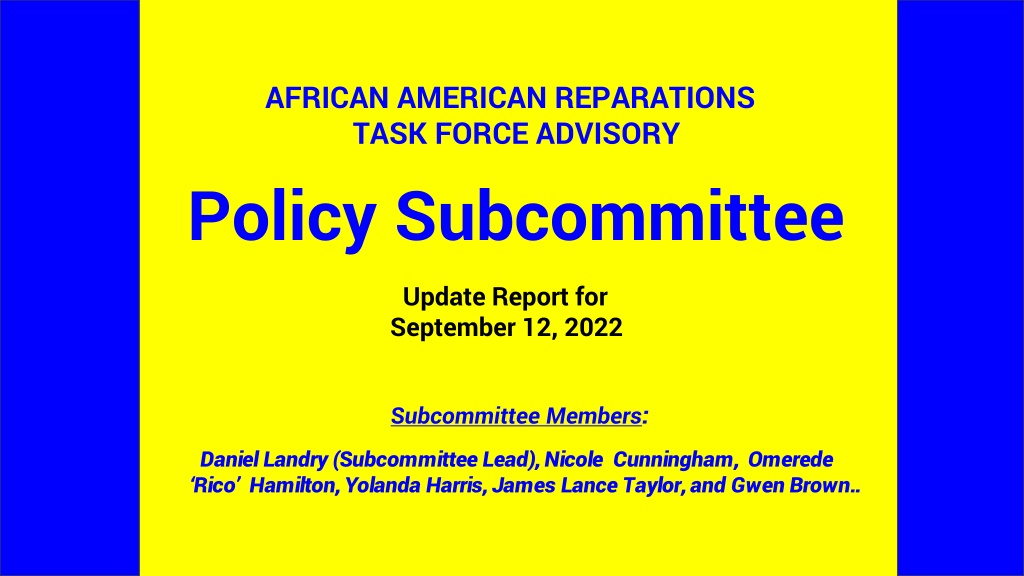

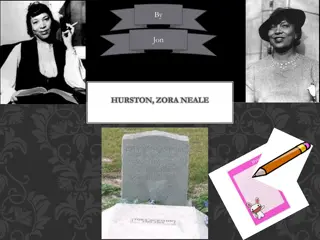
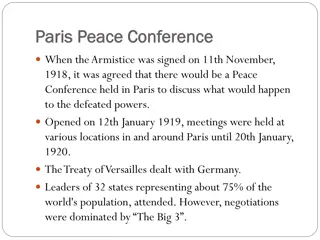
![ANC Women's League Oral Submission on Expropriation Bill [B23.2020]](/thumb/136076/anc-women-s-league-oral-submission-on-expropriation-bill-b23-2020.jpg)
